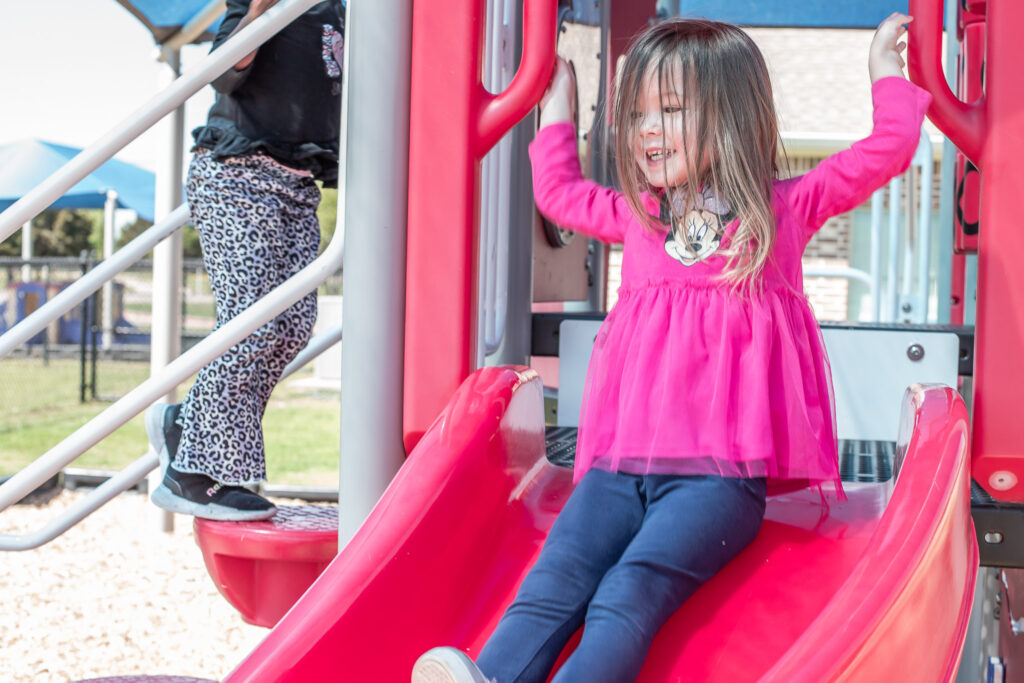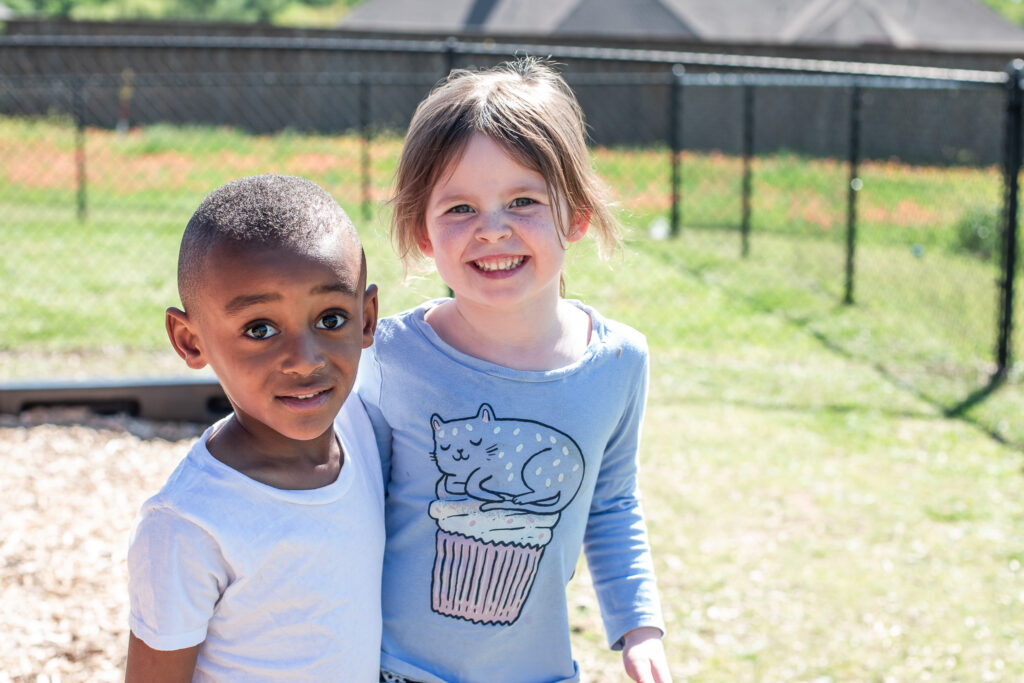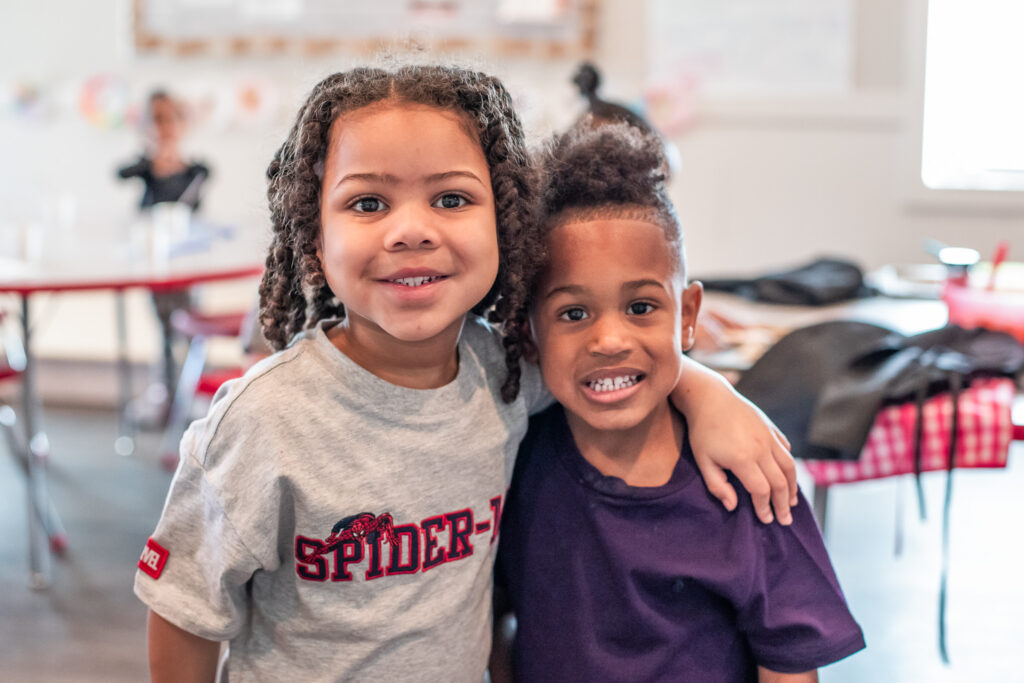The Pillars Preschool Program
Our Preschool classroom (three- and four-year-olds) is where imagination takes flight, independence blossoms, and meaningful learning begins to take root. At this stage, children are naturally curious, full of ideas, and ready to engage in more structured activities that build both academic and social-emotional skills.
Our classroom environment is thoughtfully crafted to nurture self-expression, creativity, and growing autonomy. With improved listening and communication skills, preschoolers are ready to participate in deeper conversations, cooperative play, and early problem-solving. Each day is filled with opportunities to make choices, practice responsibility, and explore leadership through play and guided learning.
As children continue to build a strong sense of self and community, we also weave in lessons on faith and character—helping them grow not only as learners but as kind and confident individuals. Our Preschool classroom supports::
- Language development and early literacy skills
- Counting and learning math concepts
- Independence with hand washing, toilet training and self-regulation
- Leading and following, and routines
- Development of gross and fine motor skills
- Building structures with blocks and real materials
- Expanded physical play
- Learning to take initiative
- Increased development of self-expression
Preschool Class Developmental Benchmarks
Our Preschool class focuses on specific developmental and spiritual benchmarks.
Language Development
- Recognizing some capital and lowercase letters
- Recognizing own written first name
- Saying or singing ABCs
- Following directions
- Participating in story time by answering questions
- Looking at books independently
- Speaking so that others can understand
- Retelling familiar stories in their own words
- Using crayons or pencils to write
Mathematics
- Recognizing numbers 1-10
- Rote counting 1-20
- Recognizing shapes
- Recognizing colors
- Beginning to see groups of 2-3 objects and knowing the amount without counting
- Tracing numbers
- Recognizing a few numbers in written form
- Completing simple patterns (ex: red, blue, red, blue)
Health & Wellness
- Eating and drinking independently at mealtime
- Becoming fully toilet trained
- Washing and drying hands without assistance
- Putting self to sleep at nap time
- Trying different kinds of nutritious foods
Cognitive Development
- Drawing a person and other recognizable objects
- Identifying all visible parts of the body
- Showing hand preference (left or right)
- Recognizing differences in object sizes
- Understanding spatial relationships (ex: behind, beside, under)
- Recalling words to songs and chants
- Naming the days of the week
Physical Development
- Catching a ball that has been bounced
- Jumping in place
- Hopping on one foot
- Kicking a moving ball
- Galloping
- Walking up and down stairs without help
- Assembling simple puzzles
- Stringing beads
- Building with blocks
- Cutting with scissors
- Beginning to draw recognizable forms
- Forming objects with playdough
Social & Emotional Development
- Working independently
- Following simple directions
- Sharing experiences with the class
- Accepting and responding to teacher’s authority in a positive way
- Cleaning up after themselves
- Separating from parents with ease
- Seeking help when needed
- Displaying a range of emotions
- Articulating how he/she is feeling
Spiritual Teaching Objectives
- The Bible is one big story that tells us about God.
- God made the earth and everything on it, including you!
- God loves you.
- Praying is how we talk to God.
- Singing is how we celebrate God.
- Jesus died on the cross to forgive us for our sins.
- We get to Heaven by believing in Jesus – who He was and what He did for us.
Sample Preschool Classroom Schedule
| 7:00 | Breakfast and Open Centers |
| 8:00 | Circle Time and Community Challenge |
| 8:30 | Learning Stations/Small Group: Language/Literacy |
| 9:00 | Call to Prayer and Spiritual Development |
| 9:30 | Outside Exploration – Physical Development |
| 10:00 | Learning Stations/Small Group: Language/Literacy |
| 11:00 | Lunch |
| 11:30 | Naptime Prep |
| 12:00 | Nap/Rest Period |
| 2:00 | Rise & Shine and Snack |
| 2:30 | Learning Stations and Small Groups–Math/Reasoning |
| 4:00 | Outside Exploration – Physical Development |
| 4:30 | Circle Time Review and Story Time |
| 5:00 | Music & Movement |
| 5:30 | Teacher Choice Centers and Departure |





Our Locations
San Antonio, TX
11040 Reed Rd, San Antonio, TX 78251
Monday – Friday
6:30 am – 6:30 pm
Currently Enrolled Families:
(210) 523-2613Prospective Families:
(210) 817-5198San Antonio
11087 Bandera Rd, San Antonio, TX 78250
Monday – Friday
6:30 am – 6:30 pm
Currently Enrolled Families:
(210) 521-8111Prospective Families:
(210) 866-8278San Antonio
24161 Boerne Stage Rd, San Antonio, TX 78255
Monday – Friday
7:00 am – 6:00 pm
Currently Enrolled Families:
(210) 698-0700Prospective Families:
(830) 217-1969San Antonio
383 Harmony Hills, Spring Branch, TX 78070
Monday – Friday
6:30 am – 6:30 pm
Currently Enrolled Families:
(830) 980-2520Prospective Families:
(210) 934-3463San Antonio
2144 Gabriels Place, New Braunfels, TX 78130
Monday – Friday
6:30 am – 6:30 pm
Currently Enrolled Families:
(830) 310-0017Prospective Families:
(830) 396-5435San Antonio
2567 FM 1103, Cibolo, Texas 78108
Monday – Friday
6:00 am – 6:30 pm
Currently Enrolled Families:
(210) 664-3366Prospective Families:
(210) 361-6598San Antonio
7852 Rimrock Springs, San Antonio, TX 78253
Monday – Friday
6:30 am – 6:30 pm
Currently Enrolled Families:
(726) 217-5551Prospective Families:
(210) 864-9207San Antonio
14931 Potranco Rd, San Antonio, TX 78245
Monday – Friday
6:30 am – 6:30 pm
Currently Enrolled Families:
(726) 217-5553Prospective Families:
(726) 224-7213San Antonio
Dallas / Ft. Worth, TX
6451 FM-663, Midlothian, TX 76065
Monday – Friday
6:30 am – 6:30 pm
Currently Enrolled Families:
(972) 775-5688Prospective Families:
(972) 833-2287Dallas/Ft Worth
3140 N Walnut Grove Rd, Midlothian, TX 76065
Monday – Friday
6:30 am – 6:30 pm
Currently Enrolled Families:
(972) 775-5855Prospective Families:
(469) 457-4783Dallas/Ft Worth
The Pillars: Colleyville-Bedford
919 Cheek-Sparger Road, Colleyville, TX 76034
Monday – Friday
6:30 am – 6:30 pm
Currently Enrolled Families:
(817) 605-9102Prospective Families:
(817) 961-9418Dallas/Ft Worth
The Pillars: Grapevine-Colleyville
2301 Hall – Johnson Rd #8725, Grapevine, TX 76051
Monday – Friday
6:30 am – 6:30 pm
Currently Enrolled Families:
(817) 868-0900Prospective Families:
(817) 646-1278Dallas/Ft Worth
8402 Chiesa Road, Rowlett, TX 75089
Monday – Friday
6:30 am – 6:00 pm
Currently Enrolled Families:
(972) 412-3900Prospective Families:
(469) 402-4905Dallas/Ft Worth
2501 Hickox Road, Rowlett, TX 75089
Monday – Friday
6:30 am – 6:00 pm
Currently Enrolled Families:
(972) 412-7036Prospective Families:
(469) 414-5537Dallas/Ft Worth
3501 Murphy Road, Richardson, TX 75082
Monday – Friday
6:30 am – 6:00 pm
Currently Enrolled Families:
(972) 680-3062Prospective Families:
(469) 689-2266Dallas/Ft Worth
1570 S. Independence Pkwy, McKinney, TX 75072
Monday – Friday
6:30 am – 6:30 pm
Currently Enrolled Families:
(469) 712-6720Prospective Families:
(469) 716-5296Dallas/Ft Worth
Johns Island, SC
953B Main Rd, Johns Island, SC 29455
Monday – Friday
6:30 am – 6:00 pm
Currently Enrolled Families:
(843) 212-5133Prospective Families:
(854) 458-7409Johns Island
